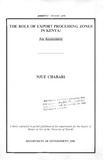| dc.description.abstract | Governments around the world have been looked upon to spearhead development
efforts. Reliance on the government to show the way forward in development matters
has been more pronounced in developing countries than in the developed ones. Since
industrialization is viewed as essential on the route to development, governments have
endeavoured to put in place programmes that could hasten the pace of industrialization.
Among the strategies effected in many developing countries is the establishment of
Export Processing Zones (EPZs).
The establishment of EPZs in Kenya was aimed at facilitating export-oriented
industrialization as well as enhancing industrial growth and development in the
country. This study assesses the role of EPZs in development, based on their role in
re-orienting industrialization to an outward-looking strategy, their contribution to
employment creation, diversification of industries, foreign exchange earnings,
technology transfer and other spinoffs.
The study is divided into six chapters comprising the introduction; literature review and
theoretical framework; the role of the state in export manufacture; EPZs in Kenya;
empirical findings and summary and conclusion. Data for the study was obtained
through primary and secondary sources. The study largely depended on available
literature for secondary data. The primary source of data was a survey carried out in
the EPZs and among non-EPZ manufacturers.
Among the findings of this study are that EPZs in Kenya have had limited success in
terms of achieving the envisaged goals that led to their establishment. First,
employment creation has been low compared to the anticipated levels, transfer of
technology has been deterred by the quest for quick profit by foreign investors and that
no significant spinoffs have accrued to Kenyans from the operations of the EPZs.
Backward linkages have not developed significantly since investors tend to source for
raw materials in foreign markets. Thus, while the EPZs are desirable, they have had
little impact on the country's economy.
The study recommends that further academic researches be carried out in the EPZs in
Kenya. On policy issues, it is recommended that the operations of EPZs in this country
be revisited to re-evaluate them in order to redirect the programme to the national
needs. Various weaknesses in project implementation, tax administration, employment
creation, transfer of technology and capital investment as well as the involvement of
the Government need to be addressed if. the programme is to be more viable. | |

